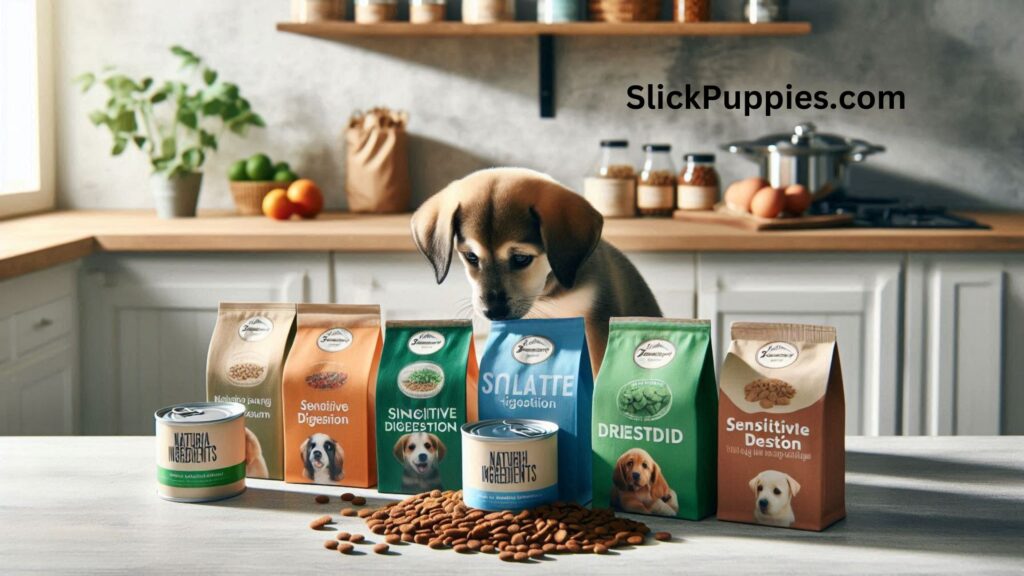Before you start looking for the best dog food for sensitive stomachs, it’s a good idea to figure out what’s causing your dog’s digestion problems. Some dogs—just like some people—are sensitive to certain food ingredients. For others, a sensitive stomach might be a sign of something more serious. It’s best to make an appointment with your vet to discuss the symptoms your dog is showing (like vomiting, diarrhea, soft stools, gas, or anything else) and get an exam.
Your vet might ask you to bring in a stool sample to help figure out what’s going on or check for parasites. While this might seem like a lot at first, keep in mind that dog food can be expensive! Working with your vet to figure out the cause of your dog’s stomach issues could actually save you money in the long run, especially if it turns out that it’s not just their food causing the problem.
What Causes Dogs to Have Sensitive Stomachs?

Once serious issues like stomach cancer are ruled out, it’s time to look at other possible causes of your dog’s sensitive stomach. There are a lot of different foods that dogs can have trouble with. Some dogs are sensitive or even allergic to certain proteins, like chicken or beef. Another possibility is that your dog’s diet might be missing something important, like fiber, vitamins, or minerals. On the flip side, it could have too much of something, like fat. And sometimes, it’s not even the dog food causing the problem! If your dog tends to get into the trash or eats a lot of treats and table scraps, something other than their food might be upsetting their tummy.
How to Know if Your Dog Has a Sensitive Stomach
When people talk about a “sensitive stomach” in dogs, they usually mean mild stomach issues or digestive upset.
Some common signs of a sensitive stomach in dogs include:
- Occasional vomiting
- Loose stools
- Flatulence (gas)
Your dog might show one of these symptoms or all of them. If any of these symptoms are really bad, it’s important to reach out to your vet right away. Vomiting and diarrhea can be signs of serious health problems, and even gas could point to a condition that needs quick attention from a vet.
Elimination Diet for Sensitive Dogs
One possible reason for your dog’s sensitive stomach could be their diet. To figure out what’s causing the issue, you can try different dog foods designed for sensitive stomachs to see which one helps settle your dog’s digestive system.

Figuring out if your dog’s food is the problem is simple, but it will take some patience. Start by working with your vet to remove any extra food from your dog’s diet—this means no table scraps, treats, or anything else they might snack on throughout the day.
You’ll also need to keep an eye on your dog to make sure they aren’t sneaking food from the trash (both inside and outside), the recycling bin, the cat’s litter box, or any other places where they might find food they shouldn’t be eating. If your dog’s stomach is still upset after a few days of cutting out everything except their regular food—and you’re sure they’re not getting into any other food sources—then it’s time to take a closer look at the food you’re feeding them.
Dog Food Ingredients That Can Upset Stomachs
Dog food is designed to be complete and balanced, which means it includes a mix of proteins, fats, grains, vitamins, minerals, and other ingredients like fruits and vegetables. However, some dogs may have sensitivities to certain parts of this mix.
Here are some food-related causes of sensitive stomachs in dogs:
Protein Source
Some dogs struggle to digest certain proteins. For example, if your dog’s food contains chicken as the main protein, ask your vet if switching to a different protein, like beef, lamb, or fish, might help. Just be sure to stop giving your dog treats or table scraps during the trial, or it’ll be hard to figure out what’s really causing the issue.
Fiber
Some dogs need more fiber in their diet. Beet pulp is a good fiber source and can help improve stool quality without messing with digestion. Other good fiber sources in dog food are inulin and psyllium. Ask your vet if adding fiber or switching to a high-fiber food would benefit your dog.
Fat
Foods high in fat can be harder for dogs to digest compared to those with more protein or carbs. Check the ingredient list of your dog’s food. If fats or oils are listed near the top, it could mean the food has too much fat. Talk to your vet about switching to a food with less fat. You can also check the “Guaranteed Analysis” section on the food label to see the crude fat percentage.
Vitamins and Minerals
Most commercial dog foods meet AAFCO standards, meaning they contain the right amount of vitamins and minerals to be considered “complete and balanced.” But if you’re feeding a raw or homemade diet, or a food not meant for your dog’s life stage (puppy, adult, etc.), there could be an imbalance or deficiency. Chat with your vet to make sure your dog’s diet has everything they need for good health and digestion, and adjust if necessary.
Quality Ingredients
It can be hard to judge the quality of ingredients in dog food since labels don’t tell you the grade of each ingredient. To make a good decision, consider the brand’s reputation, the price of the food, and what veterinarians say about it. In 2023, AAFCO introduced guidelines for labeling food as “human grade,” but even then, you can’t see the exact quality of each ingredient on the label.
One good way to gauge quality is to look for brands that have passed feeding trials and performed well in studies. If you’re unsure, it’s okay to reach out to the brand directly for more info. Newer brands might not have lots of clinical trials yet, but if they employ a board-certified veterinary nutritionist, that’s a good sign they understand dog nutrition and are making quality food.
How to Find a High-Quality Sensitive Digestion Dog Food
There are so many opinions out there about the best dog food, but it’s important to make a choice for your dog based on solid research. That can make it tricky to navigate forums, blogs, and social media, where everyone shares their thoughts on what to feed your dog. Even the website of a dog food company can be confusing or misleading. The best place to start your research is with your vet or a veterinary nutritionist.

If you haven’t already talked to your vet about your dog’s sensitive stomach, that should be your first step. You want to rule out any serious health issues before you start trying different foods on your own. Your vet might recommend a few dog food brands they trust and help you identify which ingredients or nutrients to keep an eye on as you look for a new food.
A lot of pet owners also do their own research. Look for articles and studies written by veterinarians or board-certified veterinary nutritionists—these are the experts! It’s smart to be a little skeptical while you research the best food for your dog’s sensitive stomach. If a dog food company is advertising a “miracle diet” that sounds too good to be true, it probably is (unless there’s solid, science-backed research to support it).
Also Read: How to Train a Dog to Stop Barking at Strangers?
Best Commercial Dog Foods for Sensitive Stomachs
Commercial Dog Food for Sensitive Stomachs
Commercial dog food is one of the most convenient options, and often works well for dogs with sensitive stomachs. There are a variety of formulas available to help you find one that won’t irritate your pet’s stomach. However, with so many choices, it can feel a bit overwhelming.
Some popular options for sensitive stomach dog foods are Purina Pro Plan Sensitive Skin & Stomach and Royal Canin Digestive Care.
Look for “Complete and Balanced” Formulas
When choosing a dog food, make sure it’s labeled “complete and balanced.” This means the food has all the essential nutrients your dog needs. A complete and balanced diet can help prevent sensitive stomachs caused by nutritional deficiencies and support healthy digestion.
Reading Dog Food Labels
Take a look at the rest of the label to check the sources of protein, fiber, and fat content. Also, make sure you’re choosing the right food for your dog’s life stage (puppy, adult, senior). Don’t forget to check with your vet about any potential recalls on the food you’re considering.
It may take some time to find the right food for your dog’s sensitive stomach. You might need to try a few different brands or formulas before you find the one that works. While it’s tempting to switch your dog’s food right away, be sure to transition slowly. Doing it too quickly could upset their stomach or make them refuse the new food.
How to Transition to New Food
To transition your dog to a new food, start by mixing 80-90% of the old food with 10-20% of the new food for the first meal. Gradually change this ratio over the course of 10 days. If you’re unsure, ask your vet for advice on the best way to transition your dog’s diet.
Homemade Meals for Dogs with Sensitive Stomachs
Sometimes a simple homemade meal can help settle an upset stomach. A basic dish of cooked chicken and boiled rice (without seasoning or fat) can calm an upset stomach or diarrhea. Many dog owners are now turning to homemade meals for their dogs, which can be a great option for dogs with sensitive stomachs. However, it’s important to ensure that these meals meet your dog’s nutritional needs. This can be tricky, so work with your vet or a veterinary nutritionist to ensure the meals are complete. Balance IT, a website by veterinary nutritionist Dr. Sean J. Delaney, can help guide you in creating balanced meals.
Prescription Diets for Dogs
If switching to a commercial or homemade diet doesn’t help your dog’s sensitive stomach, your vet might recommend a prescription diet. Not every dog will find relief with the same food, just like not everyone with a sensitive stomach reacts the same way. Finding the right food may take time, but don’t get discouraged. With patience and collaboration with your vet, you’ll find the best diet for your dog.



